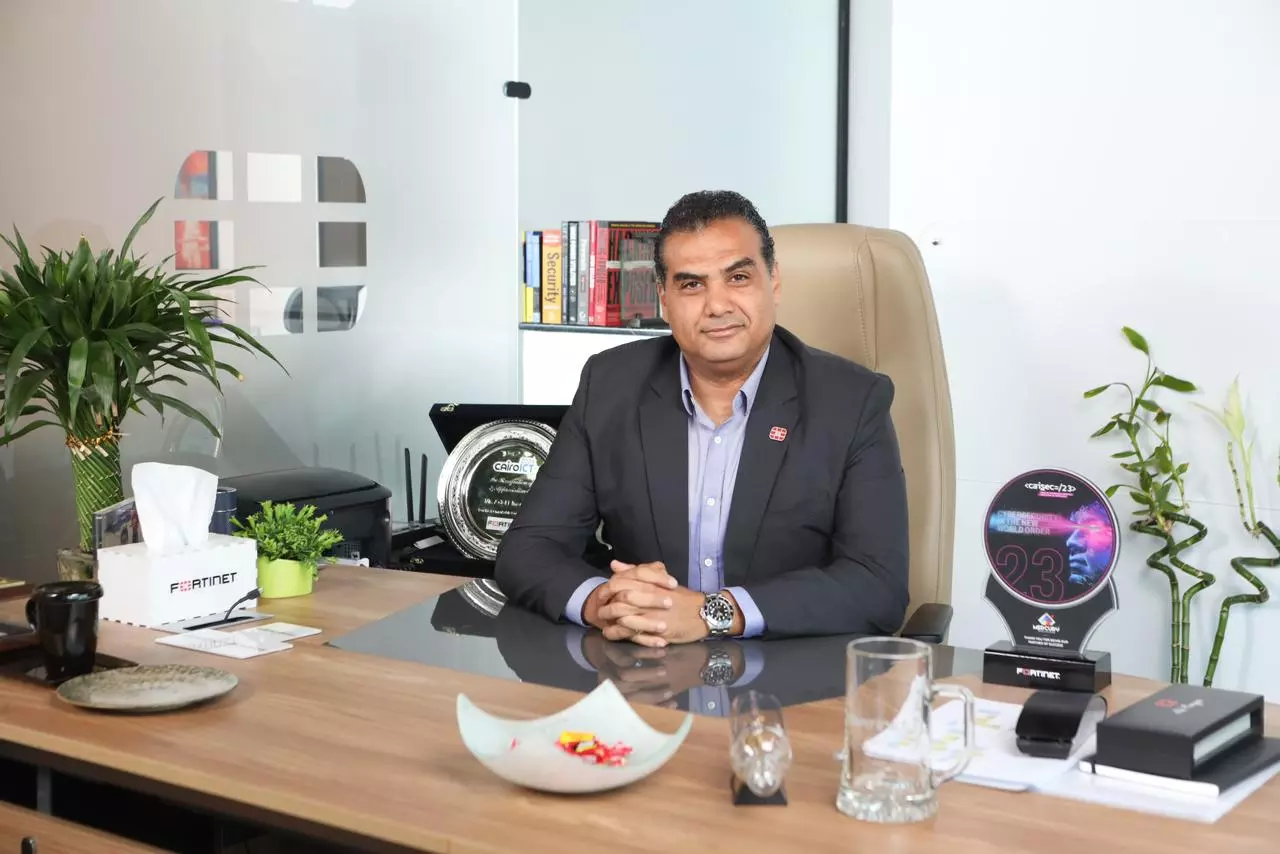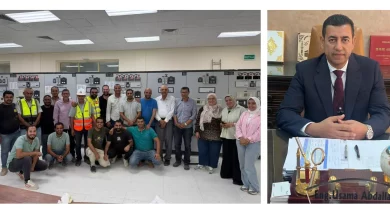Fortinet: AI-Powered Security and Zero Trust Lead Our Showcase at CAISEC 2025
في يوم 21 مايو، 2025 | بتوقيت 1:52 م

كتب: Mohamed Lotfy
In an era of accelerated digital transformation and escalating cyber threats, cybersecurity has become a cornerstone of business resilience and national security. Ahead of the highly anticipated fourth edition of the CAISEC Exhibition and Conference in Cairo, Al Alam Al Youm sat down with Khaled Fawzy, Senior Country Manager for Egypt, Libya, and Sudan at Fortinet, one of the global leaders in cybersecurity solutions.
In this exclusive interview, Fawzy discusses Fortinet’s strategic participation in CAISEC 2025, the latest innovations in AI-driven and Zero Trust security, and the evolving threat landscape in the Middle East. He also sheds light on Fortinet’s role in protecting Egypt’s critical infrastructure, supporting SMEs, and ensuring cloud security and compliance amid new data protection laws. With insights into quantum-era threats, predictive AI, and the launch of the new FortiGate 700G Series, this conversation offers a comprehensive outlook on the future of cybersecurity in the region.
Could you tell us about your participation in the fourth edition of the CAISEC Exhibition and Conference? What are the most prominent solutions and services the company is showcasing?
We’re very excited to be participating at CAISEC 2025 for the third year as a Security Sponsor. It’s a key event for us in the region and offers a great platform to connect with industry leaders, customers, and partners about the latest in cybersecurity.
This year we’ll be showcasing Fortinet’s latest innovations, particularly in the areas of AI-powered security, Zero Trust, and advanced threat protection. Our presence will span both the exhibition area – where we’ll be welcoming visitors to explore our solutions and discuss their challenges – and the conference panels, where our experts will be sharing insights and thought leadership on current trends and technologies shaping the future of the industry. Of note, Ricardo Ferreira, one of our Field CISO’s (Chief Information Security Officer), will be joining us to speak about global cybersecurity trends and updates. We know that attendees will benefit greatly from his perspective.
CAISEC has always been a significant event for us, not just to demonstrate our leadership in cybersecurity, but to engage in meaningful conversations with the cybersecurity and tech communities. We’re looking forward to another strong and successful edition this year.
What are the most prominent cyber threats currently targeting organizations in the Middle East?
In 2025, cybersecurity challenges are evolving to become even more complex. Threat actors are becoming more specialized, especially in the early stages of attacks, focusing on reconnaissance and weaponization.
Cybercrime-as-a-Service (CaaS) for example is expanding, making advanced tools like phishing kits and automated hacking solutions widely available, even to less skilled attackers. The increasing reliance on multi-cloud environments also introduces more vulnerabilities, creating a larger attack surface for cybercriminals. What’s particularly concerning is the convergence of physical and digital threats, where cyberattacks are paired with real-life intimidation tactics targeting executives and employees.
The use of AI and quantum computing will also continue to transform the threat landscape in the Middle East. Cybercriminals are already using AI to automate reconnaissance and streamline phishing attacks, and this trend will only grow. On the flip side, AI offers promise for real-time threat detection and response.
Quantum computing, while still in its early stages, could disrupt traditional encryption methods, making it crucial for businesses to adopt post-quantum cryptography to protect sensitive data. These technologies highlight the need for businesses to stay ahead of the curve and rethink their cybersecurity strategies.
How do you assess the state of cybersecurity in Egypt and the region compared to global markets?
The good news is that Egypt has already started to take important steps with national cybersecurity initiatives, sector-specific regulations, and increasing investment in cyber capabilities and talent. We are also seeing the shift from reactive to proactive cybersecurity strategies. Organizations are starting to embed security by design, investing in local talent and leveraging global best practices. We’re also witnessing greater collaboration between public and private sectors, and a stronger focus on building resilient digital ecosystems.
Interestingly, research conducted by Fortinet in 2024 found that Egypt was one of the front-runners of AI adoption in cybersecurity across Africa. Egypt led the way among organisations surveyed in South Africa, Kenya, Morocco, and Algeria, with 24% of businesses at an advanced stage.
As a cybersecurity leader, we see huge potential in the Egyptian market and we are deeply committed to supporting this growth through innovation, knowledge-sharing, and strategic partnerships.
How do Fortinet solutions help combat advanced attacks such as ransomware and zero-day attacks?
Fortinet solutions utilize a combination of advanced security features, including threat intelligence, machine learning, and sandboxing, to detect and block advanced attacks. Our next-generation firewalls, endpoint protection, and security information and event management (SIEM) solutions work together to provide comprehensive protection against ransomware, zero-day exploits, and other sophisticated threats.
Effective ransomware detection involves a combination of education and technology. With the Fortinet Security Fabric, you can block ransomware attacks, protecting all of your endpoints while securing your entire network’s entry points. Because the Security Fabric platform is powered by FortiGuard Labs, you have the most up-to-date security intelligence, ensuring you are prepared to stop new and emerging threats. To learn more, organisations can explore the full suite of our ransomware solutions.
Is Fortinet moving toward supporting predictive AI in network security? What are your efforts in this regard?
At Fortinet, we have pioneered AI innovation within cybersecurity for more than a decade, with AI serving as the backbone to the Fortinet Security Fabric and FortiGuard Labs threat intelligence and security services.
Our experts develop and utilize leading-edge ML and AI technologies to provide timely and consistently top-rated protection and actionable threat intelligence, which enables IT and security teams to better secure their organizations.
As cyber risks continue to grow, it’s important that organisations are empowered with solutions that streamlin security processes, improve decision-making, and bolster resilience against evolving threats. That’s why we’ve also expanded our generative AI, offering, which enhances seven different products across our portfolio. By integrating FortiAI in such a broad range of solutions, we’re equipping our customers with powerful, adaptive tools that transform how they manage and respond to cyberthreats.
How is Fortinet keeping pace with the increasing challenges of protecting critical infrastructure in light of rapid digital transformation?
Fortinet has been building an industry-leading OT Security Platform for 20-plus years and remains at the forefront of OT security innovation. As cyberthreats against critical infrastructure and across industries such as energy, transportation, and manufacturing continue to grow, we remain committed to delivering comprehensive security solutions tailored for operational technology environments.
Earlier this year we announced that we had advanced our OT Security Platform to further support the protection of critical infrastructure and industrial sites from evolving cyberthreats. New enhancements go beyond traditional OT visibility solutions and include deeper OT-specific threat visibility with the FortiGuard OT Security Service, expanded ruggedized solutions for segmentation and 5G in harsh environments, and an upgraded OT SecOps portfolio for automated threat response and regulatory compliance tracking. These latest enhancements give organizations the tools they need to improve their OT security posture and adhere to regulatory requirements—all managed through a single, unified platform.
To what extent are Fortinet solutions integrated into cloud environments, especially given Egyptian organizations’ reliance on cloud services?
Cloud and IoT security risks are continuing to escalate. Cloud environments continue to be a top target in all markets across the Middle East, including in Egypt, with adversaries exploiting persistent weaknesses such as open storage buckets, over-permissioned identities, and misconfigured services. In Fortinet’s 2025 Global Threat Landscape Report, in 70% of observed incidents, attackers gained access through logins from unfamiliar geographies, highlighting the critical role of identity monitoring in cloud defense.
Fortinet offers a range of solutions designed to secure cloud environments, including virtual firewalls, cloud access security brokers (CASB), and cloud workload protection platforms (CWPP). These solutions can be integrated with major cloud providers like AWS, Azure, and Google Cloud, providing consistent security across on-premises and cloud environments.
How does Fortinet ensure data privacy within its security solutions, especially with the implementation of new data protection laws in Egypt and the region?
Fortinet takes a layered approach to ensure data privacy within its security solutions, encompassing physical security, system administration, and data protection measures. We incorporate features like data encryption, access control, and data masking to protect sensitive information.
Fortinet offers tools for data loss prevention (DLP) and security information and event management (SIEM) to further enhance data privacy within its solutions. This includes leveraging technologies like firewalls, web filtering, and application control to prevent unauthorized access and data leakage.
Importantly, Fortinet also adheres to all industry standards and local laws and regulations, such as GDPR and CCPA.
What role does Fortinet play in supporting small and medium-sized enterprises (SMEs) in securing their data?
As your business evolves and undergoes digital acceleration, your office network and security may struggle to keep up. Small and medium-sized businesses (SMBs) face many of the same challenges and cyberthreats as larger organizations but often do not have the same resources.
Fortinet’s secure office solution for SMBs delivers powerful networking and security in one easy-to-manage, cost-effective solution. This enables SMBs to deliver enterprise-grade secure networking without enterprise-level complexity or cost. Designed to maximize simplicity through seamless integration, automation, and cloud-based management, Fortinet delivers complete protection across all business sites. With affordable solutions built for the office, IT teams can quickly show ROI while delivering unparalleled performance and enterprise-grade security.
Can you tell us more about the FortiGate G series and the most prominent services it provides?
Earlier this month we announced the launch of the FortiGate 700G series, a next-generation firewall (NGFW) purpose-built for the modern campus. Powered by Fortinet’s proprietary Network Processor 7 (NP7), Security Processor 5 (SP5) ASIC, and FortiOS, Fortinet’s unified operating system, the FortiGate 700G series delivers up to 7x higher firewall throughput, 4x better threat protection, and 7x lower power consumption than competitor offerings. With support for advanced networking, FortiGuard AI-Powered Security Services, and new FortiOS enhancements, including post-quantum cryptography readiness, FortiAI-Protect for AI-driven threat detection, and generative AI (GenAI) risk assessment, the FortiGate 700G helps organizations reduce risk, optimize performance, and future-proof hybrid IT environments.
With the FortiGate 700G series, we’re delivering more than just industry-leading performance – we’re equipping organizations with advanced capabilities to stay ahead of current and emerging cyberthreats. From AI-powered threat detection and GenAI risk mitigation with FortiAI-Protect to post-quantum cryptography readiness built into FortiOS, this new next-generation firewall series helps our customers consolidate infrastructure, reduce cyber risk, and confidently build for the future.















